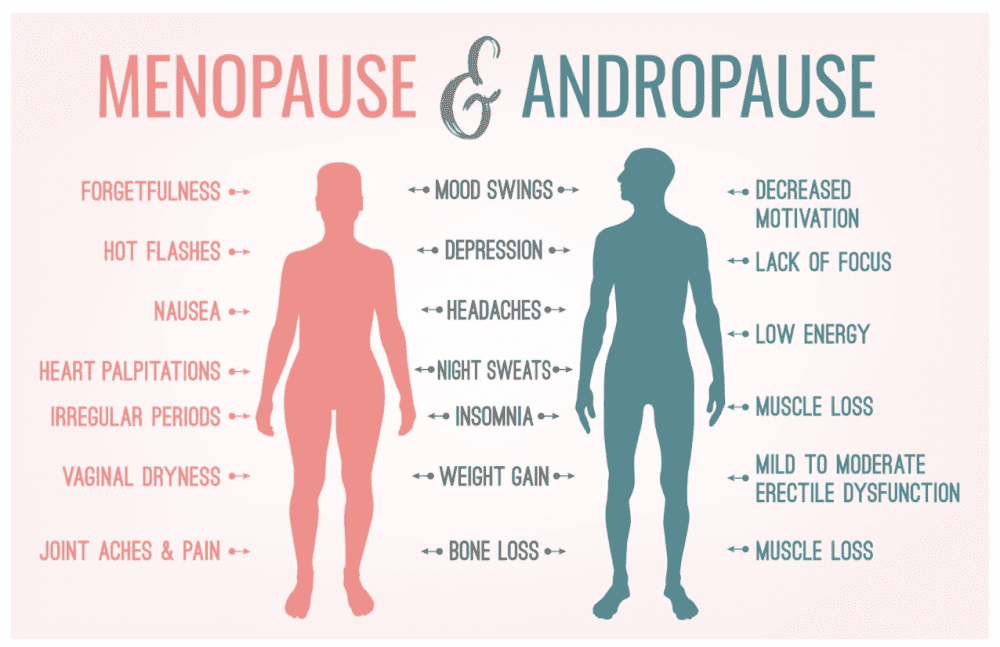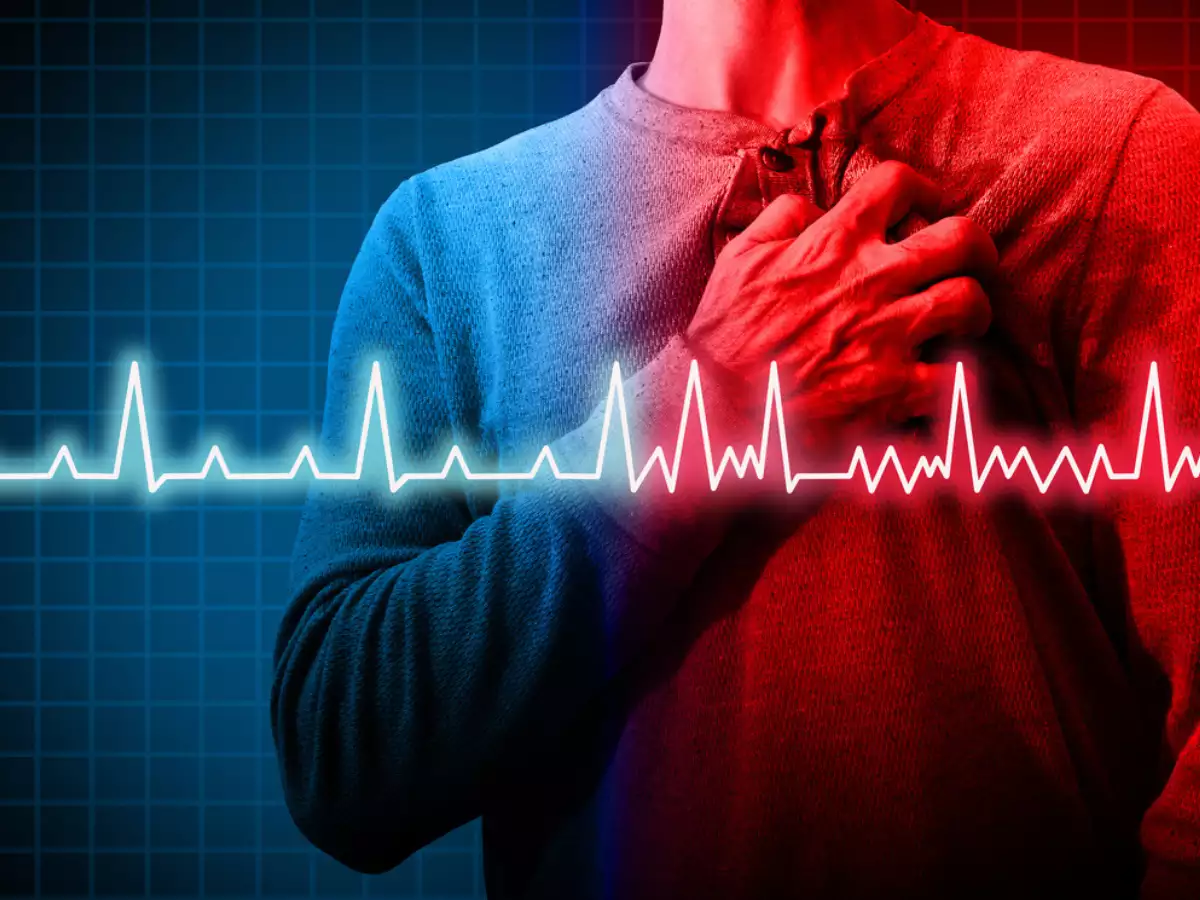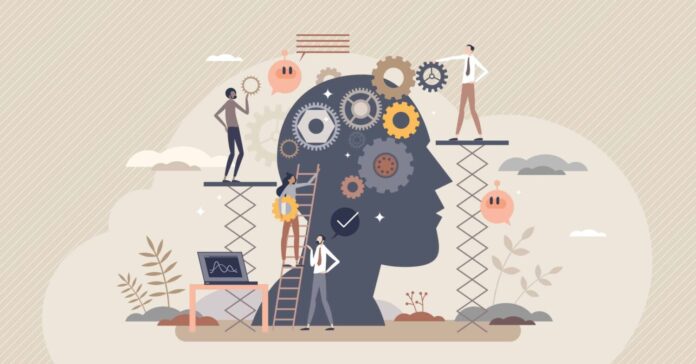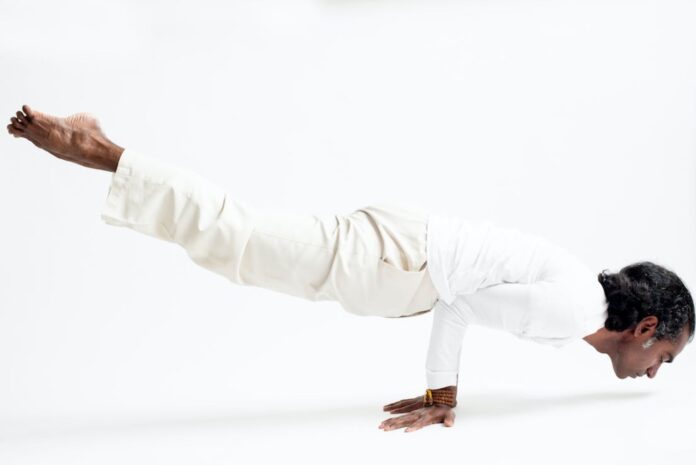While it’s great to accumulate decades of wisdom as you age, it’s not much fun to look in the mirror and see less hair on your head, more fat, and less muscle around your midsection and know you have only a fraction of the energy you had a few years ago. As for why this happens, it’s likely hormonal changes your body experiences as you age. In fact, hormones play a major role in how you look and feel physically and emotionally.
Is It Really Male Menopause?
When men age, and hormonal changes occur, it’s often said this means that male menopause is taking place. However, if you believe this will make you less of a man, you’re wrong. Unlike female menopause, where hormone production drops dramatically and quickly, your levels of testosterone and other hormones will decrease gradually as you get older. In fact, studies tend to show most older men maintain normal levels of testosterone for their age and that only about 10% of men will suffer from low testosterone during their lifetime.

Too Much Cortisol
As you age, one of the hormones in your body that will play a big role in your health and wellness is cortisol, commonly referred to as the “stress hormone.” Responsible for regulating your metabolism and your immune system, cortisol is also closely linked to your mental health, meaning an imbalance of it could lead to increased anxiety and depression. While you need a certain amount of cortisol to help you fight off stress, too much of it can lead to such problems as:
- Weight gain,
- Increased blood pressure,
- Mood swings,
- Osteoporosis.
If you start to notice such problems in your life, as well as problems with your sleep cycle, talk to your doctor and get tested for a cortisol imbalance.
Low Testosterone
Rather than let a hormonal imbalance sneak up on you and disrupt your life in numerous ways, you can choose to be proactive and test your hormone levels at home. One of the biggest benefits of at-home hormone test kits is that you can start to get answers to embarrassing problems in the privacy of your own home. For example, if you suffer from a lack of desire for sex and have been dealing with erectile dysfunction that has left you unable to get an erection or maintain one when having sex, you can use an at-home test kit to see if your testosterone levels are too low. Once you get results from an at-home test kit, it then becomes easier to talk to your doctor about what’s going on in your life.

Mental Health and Hormones: The Unseen Connection
As men age, there’s more than just the visible gray hair or wrinkles that change. Beneath the surface, hormonal alterations, particularly declining testosterone levels, play a critical role in mental well-being. Men with reduced testosterone have sometimes reported symptoms resonating with depression and mood swings, painting a vivid picture of the internal emotional roller-coaster they might be experiencing.
Recognizing these potential emotional shifts is paramount. Just as the seasons of life transition, so too can one’s emotional landscape. Discussing such changes, no matter how subtle, with healthcare professionals can be enlightening. Addressing hormonal imbalances doesn’t just level out the physical aspects; it often soothes the mind, bringing about a renewed sense of mental peace.
Bone Health: The Pillars of Our Body
Hormones, especially testosterone and estrogen, are the unsung heroes maintaining our bone’s fortitude. However, as the clock ticks and men advance in age, these hormonal levels can waver, sometimes diminishing. This fluctuation directly correlates with an increased susceptibility to osteoporosis and a decline in bone density.
Imagine the sturdy pillars of a monument slowly eroding over time. Similarly, reduced bone density can make bones fragile, increasing the chances of fractures and other bone complications. This imagery underscores the need for active hormone management to ensure the skeletal system remains robust and resilient.

Cardiovascular Health
At the core of our being lies the heart, rhythmically pumping life through our veins. Hormones, with testosterone in the spotlight, choreograph part of this intricate dance. However, dwindling testosterone levels in aging men have been associated with heart health, hinting at potential discord in this vital rhythm.
The heart’s silent song can sometimes go awry with age. To prevent any discordant notes, regular health check-ups are indispensable. Engaging in open dialogues with healthcare providers ensures that both cardiovascular health and hormonal symphony are in sync, creating a harmonious melody of life.
Cognitive Function
Our mind, a vast expanse of memories and thoughts, is incredibly intricate. Emerging research suggests hormones, notably testosterone, might be weaving part of this cognitive tapestry. Potential hormonal imbalances in aging men could cast shadows over cognitive abilities, slightly dimming the once-vibrant patterns of memory.
While we stand at the frontier of understanding the nexus between hormones and cognition, preliminary studies beckon us to take note. The mind’s labyrinth, with its twists and turns, might indeed be influenced by the ebb and flow of hormones, making it a compelling chapter in the discourse on aging and hormonal balance.

Solving the Problem
If you have low levels of testosterone or other hormones, you probably think this will mean one visit to your doctor will result in a multitude of medications being given to you to solve the problem. However, that’s not always the case. In fact, unless your hormonal imbalance is extreme, chances are your doctor will work with you to develop a treatment plan that focuses primarily on you making certain lifestyle changes. Since many imbalances regarding testosterone can be fixed through lifestyle changes, expect your doctor to recommend such things as:
- Getting more sleep,
- Limiting your stress,
- Exercise more often,
- Eat a healthier diet,
- Reduce or eliminate alcohol and smoking.
Should you suffer from a lack of energy or motivation, exercising and eating healthy may help your body produce higher amounts of testosterone and serotonin, both of which may help you feel happier and more motivated.
Pay Attention to Your Mind and Body
One of the major reasons so many men wind up dealing with the effects of low testosterone is that most of the symptoms associated with it are hard to notice. Generally, you may chalk up being a bit more tired, gaining a few pounds, or not being in the mood for sex as much as in years past to simply getting older or leading a busy life day after day. However, if you pay close attention to your mind and body, it can become easier for you to pinpoint things that just don’t seem right, which is where using an at-home test kit can help you get quick answers and treatment ideas.
Exploring various aspects of the aging process for men can also lead to discovering supportive resources like those provided by Better Body, offering valuable insights on maintaining health and well-being during this life stage.

Bottom Line
After age forty, your testosterone will decrease about one percent each year. By realizing this and doing exercise, eating right, and getting a good night’s sleep, your top priorities, you’ll stay sharp mentally, look great, and keep your sex drive going strong in the years ahead.





![Calgary’s Hottest Neighborhoods for Luxury Homebuyers [2024]](https://thewashingtonote.com/wp-content/uploads/2024/04/Calgary-324x160.png)



